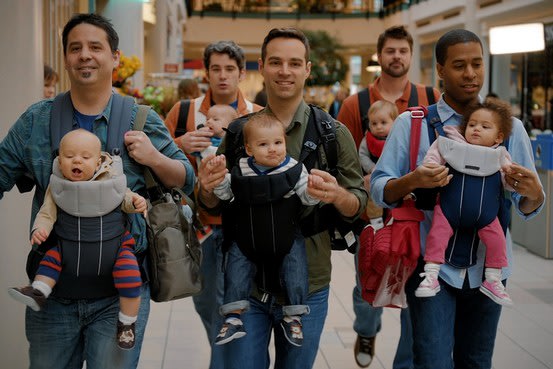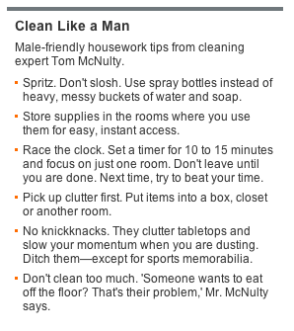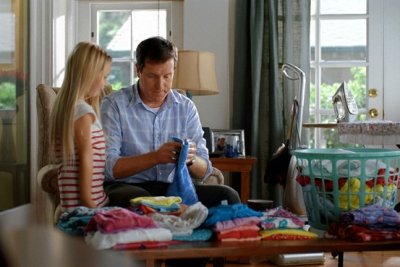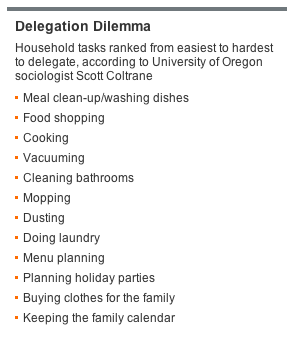Just remember: "For better or for worse" also applies to housework.
Makers of big household cleaning products are keeping close tabs on an important behavioral change inside American homes—the slow but steady reapportioning of domestic chores, as more men wash dishes, mop floors and do laundry.
Wives, in theory, should rejoice. But after generations of grumbling about doing the lion's share of housework, many find it hard to stop micromanaging.
In a 2011 survey, 57% of women said they want help more often from their partner or spouse, according to S.C. Johnson & Son, maker of Scrubbing Bubbles household cleanser, which surveyed 1,500 women and 500 men. Yet 42% of women said they don't trust their partner or spouse to meet their standards of clean.
Procter & Gamble (PG) this year introduced Tide Pods, partly to address the stress women say they feel about delegating responsibility for the laundry to husbands and other family members. The pods, single-dose pouches of detergent, eliminate the need for pouring and measuring—easing worries some women have that others will use too much or too little. Another delegating tool is P&G's Bounce dryer bar, a fabric softener installed in the dryer that lasts for months.
"She is very nervous about the thought of someone else doing laundry because she has her special recipe of how she does it," says Shellie Porter, research and development section head for Tide North America.
Women tend to have stronger feelings about housework than their husbands because they are more harshly judged if the home is a mess, says author and psychologist Joshua Coleman. "The state of the home can still be very active in a woman's identity, and that's true across a variety of social classes and education levels," he says.
A messy house is more likely to cause a woman to feel embarrassment or shame than her spouse, even if he is the primary offender, Dr. Coleman says. Negotiating the division of labor requires finesse and diplomacy on the woman's part. "The more exacting the woman is about how the home should look and the right or wrong way to clean it, the more likely the man will walk away from the bargaining table," he says.
Cheryl Courtney, 52, began sharing housework with her husband, Connie, when their first son was born. Now her two teenage sons pitch in around their Mayfield, Ky., home. "Being a teacher, I'm very much a perfectionist," she says. "I would refold the towels or go behind them to wipe things up."
Ms. Courtney has gradually relented, especially as health problems have required her to rely more on her family for housework help. "It does get me crazy sometimes, don't get me wrong," she says. "But you have to get over it."
P&G recently introduced a campaign dubbed "Man Up, Clean Up" for Swiffer mops and dusters. It urges men directly to take on more chores, but it talks to women, too. "Some people might be a little reluctant to delegate cleaning chores because they have a high standard," says Scott Beal, Swiffer's North America associate marketing director. "Swiffer's message is no matter who is behind the handle, you'll get the result that you expect."
Husbands do laundry in Tide commercials this year—a first in the brand's 66-year history. In one spot, a stay-at-home dad brags, "The clothes look amazing, and Daddy—well, he's a hero."
Kimberly-Clark (KMB), maker of Huggies diapers, says its research indicates about a third of dads are significant or equal participants in parenting. "We saw the emotional connection we could get with mom as we conveyed those tender moments that dad can have with baby," says Huggies brand director Aric Melzl. An ad featuring real dads rocking their babies to sleep has scored well with moms. "Internally, we call that ad the baby maker," Mr. Melzl says.
As they take on more domestic responsibilities, men don't appreciate being portrayed as helpless. Earlier this year, Kimberly-Clark faced criticism from dads over an ad showing fathers so distracted by a football game that they didn't change their babies' diapers. Huggies stopped running the commercial and changed the voiceover in other ads "to make clear that Huggies was not trying to put dads to the test but rather that we wanted dads to put Huggies to the test," a company spokesman says.
More companies want to ensure men are represented in their general consumer research. Typically, men make up about 20% of the sample, up from zero about three years ago, says Jonathan Asher, executive vice president of shopper-research firm Perception Research Services. Male shoppers spend less time browsing than female shoppers do, and they plan less beforehand. But men exhibit more brand loyalty, Mr. Asher says.
Bob Horwitz and his wife, Tami, each work full-time and split the housework. "I'm the bed maker, bathroom cleaner and vacuumer," says Mr. Horwitz, a 59-year-old marketing executive in Minneapolis. "She does most of the dusting and the kitchen." They do laundry together on Sundays.
Mr. Horwitz says that when he is cleaning, his technique is to create myriad piles of papers and clutter. "I hate the piles," says Ms. Horwitz, 51, a health-care product manager. "I walk by them and cringe a little bit. But as long as the cleaning gets done and gets done well, I don't care how it gets done." LINK
Makers of big household cleaning products are keeping close tabs on an important behavioral change inside American homes—the slow but steady reapportioning of domestic chores, as more men wash dishes, mop floors and do laundry.
Wives, in theory, should rejoice. But after generations of grumbling about doing the lion's share of housework, many find it hard to stop micromanaging.
Brand
marketers, with billions of dollars in product sales at stake, are
recognizing that men—many of whom remain underemployed in the
postrecession economy—are important customers, too. Companies are
retooling products and advertising to help men learn how to do
unfamiliar cleaning tasks and to give women more peace of mind about
delegating.
Men reported doing 16 minutes of housework a day in 2011, up two
minutes from 2003. Women did 52 minutes of housework on an average day,
down six minutes over the same period, according to the Bureau of Labor
Statistics.In a 2011 survey, 57% of women said they want help more often from their partner or spouse, according to S.C. Johnson & Son, maker of Scrubbing Bubbles household cleanser, which surveyed 1,500 women and 500 men. Yet 42% of women said they don't trust their partner or spouse to meet their standards of clean.
Procter & Gamble (PG) this year introduced Tide Pods, partly to address the stress women say they feel about delegating responsibility for the laundry to husbands and other family members. The pods, single-dose pouches of detergent, eliminate the need for pouring and measuring—easing worries some women have that others will use too much or too little. Another delegating tool is P&G's Bounce dryer bar, a fabric softener installed in the dryer that lasts for months.
"She is very nervous about the thought of someone else doing laundry because she has her special recipe of how she does it," says Shellie Porter, research and development section head for Tide North America.
Men's
enthusiasm for cleaning gadgets is influencing household purchasing. A
Dyson spokeswoman says when it comes to buying full-size vacuum
cleaners, women take the lead. But men have an equal say in buying
cordless vacuums—suggesting a male predilection for these handy tools.
Today, men on average do almost a third of housework, says Scott
Coltrane, an author, sociologist and dean at the University of Oregon.
That's up from an average of less than a fifth in 1965, when men mainly
took out the trash and tended the yard. Data suggest the changes will
last, Dr. Coltrane says. "Gender roles fall away when they no longer
make sense." Women tend to have stronger feelings about housework than their husbands because they are more harshly judged if the home is a mess, says author and psychologist Joshua Coleman. "The state of the home can still be very active in a woman's identity, and that's true across a variety of social classes and education levels," he says.
A messy house is more likely to cause a woman to feel embarrassment or shame than her spouse, even if he is the primary offender, Dr. Coleman says. Negotiating the division of labor requires finesse and diplomacy on the woman's part. "The more exacting the woman is about how the home should look and the right or wrong way to clean it, the more likely the man will walk away from the bargaining table," he says.
Cheryl Courtney, 52, began sharing housework with her husband, Connie, when their first son was born. Now her two teenage sons pitch in around their Mayfield, Ky., home. "Being a teacher, I'm very much a perfectionist," she says. "I would refold the towels or go behind them to wipe things up."
Ms. Courtney has gradually relented, especially as health problems have required her to rely more on her family for housework help. "It does get me crazy sometimes, don't get me wrong," she says. "But you have to get over it."
P&G recently introduced a campaign dubbed "Man Up, Clean Up" for Swiffer mops and dusters. It urges men directly to take on more chores, but it talks to women, too. "Some people might be a little reluctant to delegate cleaning chores because they have a high standard," says Scott Beal, Swiffer's North America associate marketing director. "Swiffer's message is no matter who is behind the handle, you'll get the result that you expect."
Husbands do laundry in Tide commercials this year—a first in the brand's 66-year history. In one spot, a stay-at-home dad brags, "The clothes look amazing, and Daddy—well, he's a hero."
"We're
trying to reflect this new household as much as possible," says Chris
Lillich, P&G's associate marketing director for North America
laundry. "These dads aren't hapless, they're real guys who know what
they're doing."
In time for football season, Tide, a National Football League
sponsor, put New Orleans Saints quarterback Drew Brees on its
sports-gear detergent bottles. The brand signed up TV host and husband
Nick Lachey as a spokesman. "A guy is going to look at those two as
credible sources of information," Mr. Lillich says.Kimberly-Clark (KMB), maker of Huggies diapers, says its research indicates about a third of dads are significant or equal participants in parenting. "We saw the emotional connection we could get with mom as we conveyed those tender moments that dad can have with baby," says Huggies brand director Aric Melzl. An ad featuring real dads rocking their babies to sleep has scored well with moms. "Internally, we call that ad the baby maker," Mr. Melzl says.
As they take on more domestic responsibilities, men don't appreciate being portrayed as helpless. Earlier this year, Kimberly-Clark faced criticism from dads over an ad showing fathers so distracted by a football game that they didn't change their babies' diapers. Huggies stopped running the commercial and changed the voiceover in other ads "to make clear that Huggies was not trying to put dads to the test but rather that we wanted dads to put Huggies to the test," a company spokesman says.
More companies want to ensure men are represented in their general consumer research. Typically, men make up about 20% of the sample, up from zero about three years ago, says Jonathan Asher, executive vice president of shopper-research firm Perception Research Services. Male shoppers spend less time browsing than female shoppers do, and they plan less beforehand. But men exhibit more brand loyalty, Mr. Asher says.
Bob Horwitz and his wife, Tami, each work full-time and split the housework. "I'm the bed maker, bathroom cleaner and vacuumer," says Mr. Horwitz, a 59-year-old marketing executive in Minneapolis. "She does most of the dusting and the kitchen." They do laundry together on Sundays.
Mr. Horwitz says that when he is cleaning, his technique is to create myriad piles of papers and clutter. "I hate the piles," says Ms. Horwitz, 51, a health-care product manager. "I walk by them and cringe a little bit. But as long as the cleaning gets done and gets done well, I don't care how it gets done." LINK






